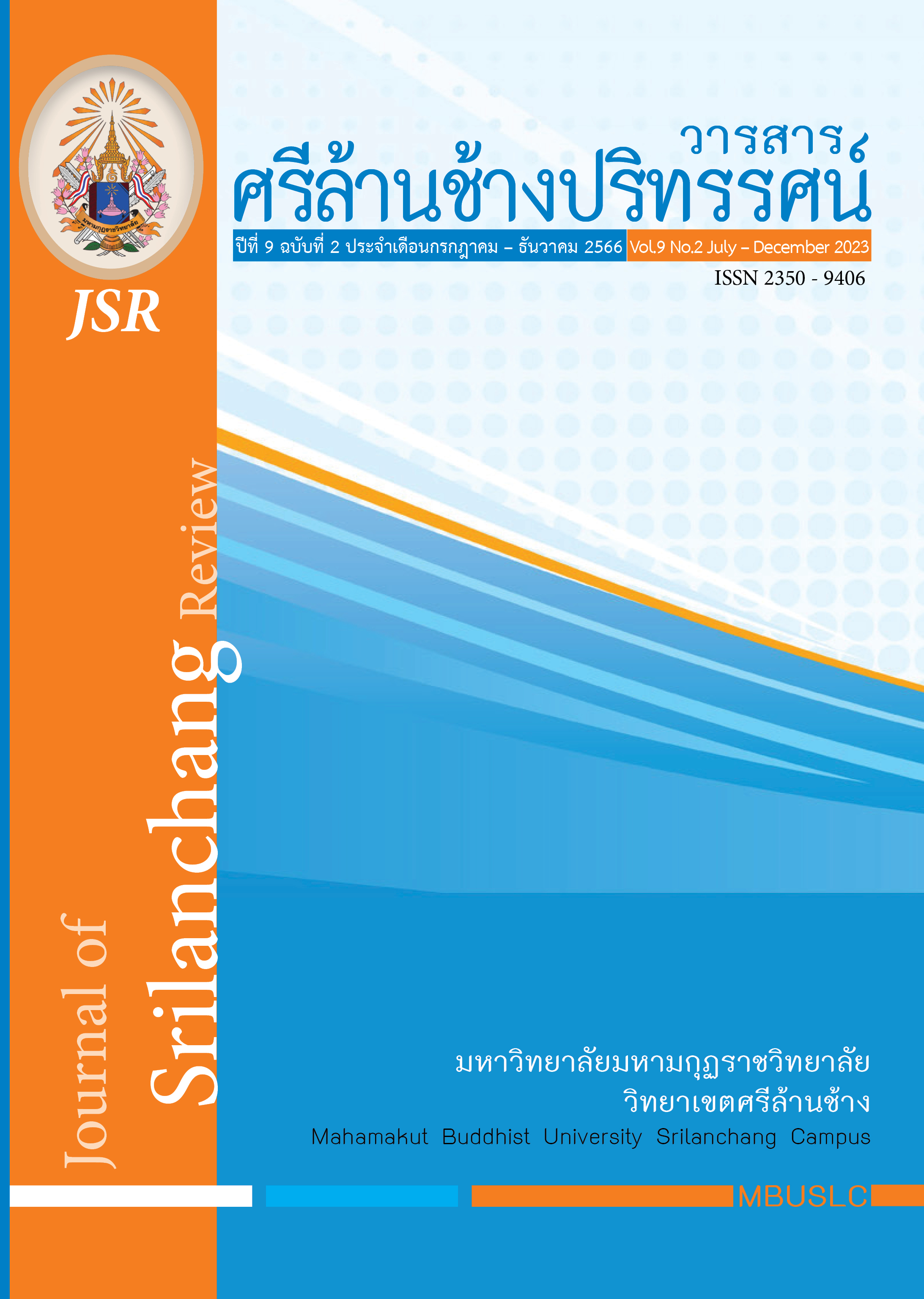BUDDHIST TEACHINGS IN BUDDHISM-APPLIED NOVEL: “RAK BORISUT” BY NORARAT RAKDEE
Main Article Content
Abstract
The objective of the academic article was to study the principles of Buddhism in the novel “Rak Borisut.” The novel was composed by Norarat Rakdee, applied to the Buddha’s teachings. The text of the novel was studied through the contemporary literary analysis. The finding revealed that The Buddhist principles in the novel were seen in three issues. The first was on the living life, considered from the Buddhist proverb as Satisampattha Sampada, translated that the endowment with mindfulness and the absence of heedlessness. The other finding was the teachings of Buddhism. For example, the teaching on the law of action, which was constant and unchangeable as proclaimed by the Buddha. The teaching on good behavior was “I believed in the Buddha’s teaching. He said to do good was good, even unseen by anyone, but the consequence from doing good was still good.” The teaching on householding was “You had to be qualified with what was called ‘Ruean Sarm Nam See’ in Thai.” The teaching on the lifestyle was “The human life required learning. While learning, they had to be happy and pleased without pressure. The motivation had to be generated through what the Buddha called Chanda (will or aspiration). When there was a will or aspiration (Chanda in Pali), an effort (Viriya in Pali), thoughtfulness or an active thought (Chitta in Pali), and investigation or examination (Vimangsa in Pali) would be followed continuously.” The teaching on such Thai proverbs as Tai Nam Tuen (referred to ‘Fish die in shallow water.’), Doo Vau Hai Doo Hang Doo Nang Hai Doo Mae (compared with ‘Like mother, like daughter’), and Dern Tam Phoo Yai Maa Mai Kad (described that a person believing and following an experienced and qualified person would be easily successful.).
Article Details

This work is licensed under a Creative Commons Attribution-NonCommercial-NoDerivatives 4.0 International License.
บทความที่ได้รับการพิจารณาจากคณะกรรมการผู้ทรงคุณวุฒิและเผยแผ่ในวารสารฉบับนี้ เป็นทัศนคติและข้อคิดเห็นส่วนบุคคลของผู้เขียนแต่ละท่าน ไม่ถือว่าเป็นทัศนะคติและความรับผิดชอบ
ของบรรณาธิการ
บทความ ข้อมูล เนื้อหา รูปภาพ ฯลฯ ที่ได้รับการตีพิมพ์ในวารสารศรีล้านช้างปริทรรศน์ ถือเป็นลิขสิทธิ์ของวารสารศรีล้านช้างปริทรรศน์ หากบุคคลหรือหน่วยงานใดต้องการนำทั้งหมดหรือส่วนหนึ่งส่วนใดไปเผยแพร่ต่อหรือเพื่อกระทำการใด ๆ จะต้องได้รับอนุญาตเป็นลายลักอักษรจากวารสารศรีล้านช้างปริทรรศน์ ก่อนเท่านั้น
References
กิตติยา คุณารักษ์ และคณะ. (2564). อำนาจผี บารมีพุทธ: ความเชื่อเชิงอุดมการณ์ทางศาสนาในนวนิยาย จินตนิยมเรื่องมิติที่สาม. วารสารบัณฑิตสาเกตปริทรรศน์. 6(2). กรกฎาคม-ธันวาคม.
กิตติยา คุณารักษ์ และมาโนช นันทพรม. (2565). กลวิธีการประพันธ์และแนวคิดพุทธศาสนาใน นวนิยายประยุกต์อิงหลักธรรม เรื่อง “รักอันตราย” นรรัตน์ รักดี. วารสารศรีล้านช้างปริทรรศน์. 8(1). มกราคม-มิถุนายน.
ขุนวิจิตรมาตรา (สง่า กาญจนาคพันธุ์). (2541). สำนวนไทย. (พิมพ์ครั้งที่ 4). กรุงเทพฯ: ดวงกมลสมัย.
นรรัตน์ รักดี. (2565). รักบริสุทธิ์. เลย: บจก.รุ่งแสงธุรกิจการพิมพ์.
พระมหาสุริยา อภิวฑฺฒโน (มะสันเทียะ). (2563). การเผยแผ่พระพุทธศาสนาตามหลักโอวาทปาติโมกข์ : หลักการ อุดมการณ์ และวิธีการ. วารสาร มจร มนุษยศาสตร์ปริทรรศน์, 6(1). มกราคม-มิถุนายน.
วัฒนา มุลเมืองแสน. (2539). นวนิยายอิงพุทธศาสนาของไทย : วรรณกรรมคำสอนร่วมสมัย. วิทยานิพนธ์ (อ.ม.) จุฬาลงกรณ์มหาวิทยาลัย.
เกษม ศิริสัมพันธ์. (2548). ความไม่ประมาท. [ออนไลน์]. จาก https:// mgronline.com /daily/detail/9480000000612. [สืบค้นเมื่อ วันที่ 8 มิถุนายน 2566].
สามารถ มังสัง. (2564). กฎแห่งกรรม : กฎอยู่เหนือคนและกาลเวลา. [ออนไลน์]. จากhttps://mgronline.com/daily/detail/964000050017. [สืบค้นเมื่อ วันที่ 9 มิถุนายน 2566].
สามารถ มังสัง. (2564). จิตที่ฝึกดีแล้ว ทำให้คนเป็นมนุษย์. [ออนไลน์]. จากhttps://mgronline.com/daily/detail/9640000089098. [สืบค้นเมื่อ วันที่ 10 มิถุนายน 2566].


